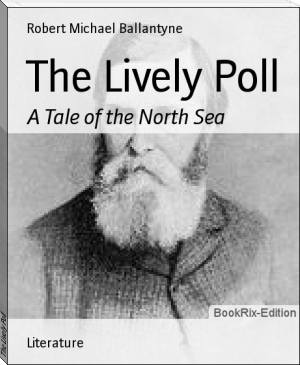The Lively Poll, Robert Michael Ballantyne [best novels to read to improve english txt] 📗

- Author: Robert Michael Ballantyne
Book online «The Lively Poll, Robert Michael Ballantyne [best novels to read to improve english txt] 📗». Author Robert Michael Ballantyne
But Skipper Bryce had eyes for only one boat. He saw it rise to view and disappear steadily, regularly, until it was about half-way to the steamer; then suddenly it failed to rise, and next moment three heads were seen amid the tumultuous waters where the boat should have been.
With a tremendous shout Bryce sprang to the tiller and altered the vessel's course, but, as the wind blew, he knew well it was not in his power to render timely aid. That peculiar cry which tells so unmistakably of deadly disaster was raised from the boats nearest to that which had sunk, and they were rowed towards the drowning men, but the boats were heavy and slow of motion. Already they were too late, for two out of the three men had sunk to rise no more--dragged down by their heavy boots and winter clothing. Only one continued the struggle. It was Dick Martin. He had grasped an oar, and, being able to swim, kept his head up. The intense cold of the sea, however, would soon have relaxed even his iron grip, and he would certainly have perished, had it not been that the recently arrived mission vessel chanced to be a very short distance to windward of him. A slight touch of the helm sent her swiftly to his side. A rope was thrown. Martin caught it. Ready hands and eager hearts were there to grasp and rescue. In another moment he was saved, and the vessel swept on to mingle with the other smacks--for Martin was at first almost insensible, and could not tell to which vessel of the fleet he belonged.
Yes, the bad man was rescued, though no one would have sustained much loss by his death; but in Yarmouth that night there was one woman, who little thought that she was a widow, and several little ones who knew not that they were fatherless. The other man who perished was an unmarried youth, but he left an invalid mother to lifelong mourning over the insatiable greed of the cold North Sea.
Little note was taken of this event in the fleet. It was, in truth, a by no means unusual disaster. If fish are to be found, fair weather or foul, for the tables on land, lives must be risked and lost in the waters of the sea. Loss of life in ferrying the fish being of almost daily occurrence, men unavoidably get used to it, as surgeons do to suffering and soldiers to bloodshed. Besides, on such occasions, in the great turmoil of winds and waves, and crowds of trawlers and shouting, it may be only a small portion of the fleet which is at first aware that disaster has occurred, and even these must not, cannot, turn aside from business at such times to think about the woes of their fellow-men.
Meanwhile Dick Martin had fallen, as the saying is, upon his feet. He was carried into a neatly furnished cabin, put between warm blankets in a comfortable berth, and had a cup of steaming hot coffee urged upon him by a pleasant-voiced sailor, who, while he inquired earnestly as to how he felt, at the same time thanked the Lord fervently that they had been the means of saving his life.
CHAPTER EIGHT.
TELLS OF MORE THAN ONE SURPRISE.
"Was that your boat that went down?" shouted Groggy Fox of the _Cormorant_, as he sailed past the _Fairy_, after the carrying-steamer had left, and the numerous fishing-smacks were gradually falling into order for another attack on the finny hosts of the sea.
They were almost too far apart for the reply to be heard, and possibly Bryce's state of mind prevented his raising his voice sufficiently, but it was believed that the answer was "Yes."
"Poor fellows!" muttered Fox, who was a man of tender feelings, although apt to feel more for himself than for any one else.
"I think Dick Martin was in the boat," said the mate of the _Cormorant_, who stood beside his skipper. "I saw them when they shoved off, and though it was a longish distance, I could make him out by his size, an' the fur cap he wore."
"Well, the world won't lose much if he's gone," returned Fox; "he was a bad lot."
It did not occur to the skipper at that time that he himself was nearly, if not quite, as bad a "lot." But bad men are proverbially blind to their own faults.
"He was a cross-grained fellow," returned the mate, "specially when in liquor, but I never heard no worse of 'im than that."
"Didn't you?" said Fox; "didn't you hear what they said of 'im at Gorleston?--that he tried to do his sister out of a lot o' money as was left her by some cove or other in furrin parts. An' some folk are quite sure that it was him as stole the little savin's o' that poor widdy, Mrs Mooney, though they can't just prove it agin him. Ah, he is a bad lot, an' no mistake. But I may say that o' the whole bilin' o' the Martins. Look at Fred, now."
"Well, wot of him?" asked the mate, in a somewhat gruff tone.
"What of him!" repeated the skipper, "ain't he a hypocrite, with his smooth tongue an' his sly ways, as if butter wouldn't melt in his mouth, an' now--where is he?"
"Well, _where_ is he!" demanded the mate, with increasing gruffness.
"Why, in course nobody knows where he is," retorted the skipper; "that's where it is. No sooner does he get a small windfall--leastwise, his mother gets it--than he cuts the trawlers, an' all his old friends without so much as sayin' `Good-bye,' an' goes off to Lunnon or somewheres, to set up for a gentleman, I suppose."
"I don't believe nothin' o' the sort," returned the mate indignantly. "Fred Martin may be smooth-tongued and shy if you like, but he's no hypercrite--"
"Hallo! there's that mission ship on the lee bow," cried Fox, interrupting his mate, and going over to the lee side of the smack, whence he could see the vessel with the great blue flag clearly. "Port your helm," he added in a deep growl to the man who steered. "I'll give her a wide berth."
"If she was the _coper_ you'd steer the other way," remarked the mate, with a laugh.
"In course I would," retorted Fox, "for there I'd find cheap baccy and brandy."
"Ay, bad brandy," said the mate; "but, skipper, you can get baccy cheaper aboard the mission ships now than aboard the _coper_."
"What! at a shillin' a pound?"
"Ay, at a shillin' a pound."
"I don't believe it."
"But it's a fact," returned the mate firmly, "for Simon Brooks, as was in the Short-Blue fleet last week, told me it's a noo regulation-- they've started the sale o' baccy in the Gospel ships, just to keep us from going to the _copers_."
"That'll not keep _me_ from going to the _copers_," said Groggy Fox, with an oath.
"Nor me," said his mate, with a laugh; "but, skipper, as we are pretty nigh out o' baccy just now, an' as the mission ship is near us, an' the breeze down, I don't see no reason why we shouldn't go aboard an' see whether the reports be true. We go to buy baccy, you know, an' we're not bound to buy everything the shop has to sell! We don't want their religion, an' they can't force it down our throats whether we will or no."
Groggy Fox vented a loud laugh at the bare supposition of such treatment of his throat, admitted that his mate was right, and gave orders to launch the boat. In a few minutes they were rowing over the still heaving but now somewhat calmer sea, for the wind had fallen suddenly, and the smacks lay knocking about at no great distance from each other.
It was evident from the bustle on board many of them, and the launching of boats over their bulwarks, that not a few of the men intended to take advantage of this unexpected visit of a mission vessel. No doubt their motives were various. Probably some went, like the men of the _Cormorant_, merely for baccy; some for medicine; others, perhaps, out of curiosity; while a few, no doubt, went with more or less of desire after the "good tidings," which they were aware had been carried to several of the other fleets that laboured on the same fishing-grounds.
Whatever the reasons, it was evident that a goodly number of men were making for the vessel with the great blue flag. Some had already reached her; more were on their way. The _Cormorant's_ boat was among the last to arrive.
"What does MDSF stand for?" asked Skipper Fox, as they drew near.
"Mission to Deep-Sea Fishermen," answered the mate, whose knowledge on this and other points of the Mission were due to his intercourse with his friend Simon Brooks of the Short-Blue. "But it means more than that," he continued. "When we are close enough to make 'em out, you'll see little letters _above_ the MDSF which make the words I've just told you, an' there are little letters _below_ the MDSF which make the words Mighty Deliverer, Saviour, Friend."
"Ay! That's a clever dodge," observed Groggy Fox, who, it need hardly be said, was more impressed with the ingenuity of the device than with the grand truth conveyed.
"But I say, mate, they seems to be uncommonly lively aboard of her."
This was obviously the case, for by that time the boat of the _Cormorant_ had come so near to the vessel that they could not only perceive the actions of those on board, but could hear their voices. The curiosity of Skipper Fox and his men was greatly roused, for they felt convinced that the mere visit of a passing mission ship did not fully account for the vigorous hand-shakings of those on the deck, and the hearty hailing of newcomers, and the enthusiastic cheers of some at least of the little boats' crews as they pulled alongside.
"Seems to me as if they've all gone mad," remarked Groggy Fox, with a sarcastic grin.
"I would say they was all drunk, or half-seas over," observed the mate, "if it was a _coper_, but in a Gospel ship that's impossible, 'cause they're teetotal, you know. Isn't that the boat o' the Admiral that's pullin' alongside just now, skipper?"
"Looks like it, mate. Ay, an' that's Stephen Lockley of the _Lively Poll_ close astarn of 'im--an' ain't they kickin' up a rumpus now!"
Fox was right, for when the two little boats referred to ranged alongside of the vessel, and the men scrambled up the side on to her deck, there was an amount of greeting, and hand-shaking, and exclaiming in joyful surprise, which threw all previous exhibitions in that way quite into the shade, and culminated in a mighty cheer, the power of which soft people with shore-going throats and lungs and imaginations cannot hope to emulate or comprehend!
The cheer was mildly repeated with mingled laughter when the crowd on deck turned to observe the arrival of the _Cormorant's_ boat.
"Why, it's the skipper o' the _Ironclad_!" exclaimed a voice. "No, it's





Comments (0)